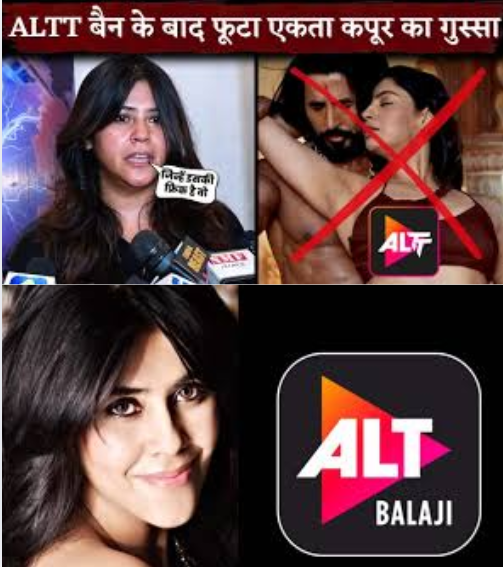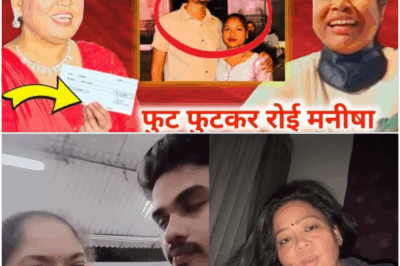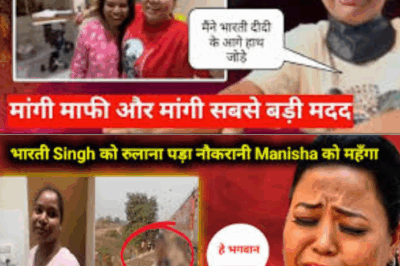Ekta Kapoor Breaks Silence on ALTBalaji and Several Other OTT Platforms by Indian Government
In a major crackdown on online streaming content, the Indian government took a bold and unprecedented step by banning 25 OTT (Over-the-Top) apps alleged to be promoting obscene and vulgar content. Among the most high-profile names on the banned list were Ullu and ALT, the latter previously known as ALT Balaji, a platform once closely associated with television producer Ekta Kapoor and her mother, Shobha Kapoor. This development has sparked intense debate about the regulation of OTT content, the fine line between creative freedom and societal responsibility, and the role of celebrities in shaping online culture.
The ban has triggered a wave of speculation and criticism, with public attention squarely falling on Ekta Kapoor, one of the most powerful names in Indian entertainment. As soon as the news of the ban broke, social media was flooded with discussions linking her to ALT, prompting the producer to issue a public statement in response.
Ekta Kapoor took to her Instagram account to share an official note, making it clear that she had severed all ties with ALT in June 2021. In the statement, she emphasized that both she and her mother Shobha Kapoor are no longer associated with the OTT platform, which was once a subsidiary of their production house, Balaji Telefilms Ltd. Kapoor added that any media reports or public claims suggesting otherwise are misleading and incorrect.
She urged media outlets to verify their facts and reiterated that Balaji Telefilms continues to operate in full compliance with legal standards and ethical business practices. Her statement was a strong attempt at dissociating herself from a platform now tainted by controversy, though the public memory of her active role in shaping ALT’s content catalog remains fresh.
The ALT platform, launched as a bold alternative to traditional Indian entertainment, quickly gained attention for its erotic-themed web series, many of which pushed boundaries previously unseen on Indian screens. From titles like XXX, Gandii Baat, and Ragini MMS Returns, ALT carved out a niche audience seeking adult content outside the censorship parameters of cinema and TV. However, with popularity came intense scrutiny, as critics and cultural watchdogs frequently called out the platform for blurring the lines between bold storytelling and outright obscenity.

According to a News18 report, the controversy surrounding ALT intensified when it was revealed that in 2015, Ekta Kapoor had allegedly added a “nudity clause” in contracts signed by actors involved in ALT productions. This clause reportedly restricted actors from declining intimate scenes or dialogues, leading to discomfort among many, particularly newcomers and struggling artists. While some argued it was a contractual necessity in the adult content business, others criticized it as exploitative, especially in an industry known for power imbalances.
This clause remained a flashpoint in discussions about ALT’s ethics, with many pointing fingers at Kapoor for enabling a culture of coercion under the guise of contractual professionalism. Even with mounting criticism and concerns raised by the Central Board of Film Certification (CBFC) and other moral guardians, the platform continued to produce and promote its sexually explicit content, often defending it as bold, modern storytelling.
In a recent interview, just days before the ban, Ekta Kapoor had reportedly defended the content on ALT, suggesting that India’s OTT viewers are mature enough to choose what they want to watch and that creators should not be policed in the name of morality. Her stance was polarizing — while some applauded her for speaking up for creative freedom, others accused her of evading responsibility for the type of content being marketed under her name.
ALT’s controversial content not only drew criticism from the general public but also from religious and social organizations, who argued that such material is corrupting young minds, disrespecting Indian culture, and lowering content standards on digital platforms. Ullu, another platform banned in the recent government move, has also been under similar fire for prioritizing soft porn over storytelling.

This ban, described as one of the strictest actions yet against OTT platforms in India, could set a precedent for more aggressive content regulation in the future. According to government officials, these platforms were in clear violation of Indian IT rules, promoting lewd, vulgar, and morally damaging material. Moreover, some apps were accused of failing to implement parental controls or proper age-verification systems, making explicit content easily accessible to minors.
Digital rights activists, however, have expressed concern over this ban. While many agree that content moderation is necessary, they fear this move could be used as a tool to suppress independent creators, especially those producing politically or socially bold narratives. The concern lies in the possibility that the definition of ‘obscene’ may become increasingly arbitrary and politicized, threatening artistic liberty.
Ekta Kapoor, who once revolutionized Indian television with her family dramas and made a mark with shows like Kyunki Saas Bhi Kabhi Bahu Thi, had ventured into digital with a promise to modernize Indian storytelling. However, her OTT journey has often appeared at odds with her traditional TV image. ALT Balaji, while initially pitched as a space for “edgy and experimental content,” gradually tilted towards titillating narratives, often criticized as lacking substance.
With the recent ban and her public distancing from ALT, Kapoor seems to be attempting a strategic image correction. For a producer who still commands massive influence in Bollywood and the TV world, aligning with a platform accused of pushing obscenity could damage her brand credibility, especially in a conservative socio-political climate.
What happens next remains to be seen. There’s speculation that ALT may attempt a rebrand or legal comeback, or that other lesser-known banned apps may file appeals. For now, however, the government’s action has sent a clear warning to the OTT ecosystem: crossing certain moral and legal lines will not be tolerated.

The broader question for India’s digital entertainment space is this: where does one draw the line between freedom of expression and public decency? Are adult-themed narratives automatically obscene, or should there be room for nuanced, mature content that respects both creative ambition and cultural sensitivity?
As platforms navigate these murky waters, the onus now lies on content creators, regulators, and audiences to shape a responsible digital future, one that embraces bold storytelling without forsaking ethics, dignity, and inclusivity. Whether this ban is the beginning of a cleaner OTT space or a stifling clamp on artistic freedom is a debate that will continue to dominate headlines in the days to come.
Play video :
https://youtu.be/Oh6biB5-j2k?si=tSPhvqYj2WLoSC-c
News
Archana Puran Singh Surprised To Meet Yogita Bihani Son Aaryamann Sethi’s Girlfriend
Archana Puran Singh Surprised To Meet Yogita Bihani Son Aaryamann Sethi’s Girlfriend In a heartwarming moment that has taken social…
After Sanjay Kapoor’s Death, Karisma Gets Justice? Shocking Revelations in Mother’s Official Letter
After Sanjay Kapoor’s Death, Karisma Gets Justice? Shocking Revelations in Mother’s Official Letter . . . After Sanjay Kapoor’s Death,…
Bharti Singh’s Final Gift to Manisha – But Why Is She Crying Now?
Bharti Singh’s Final Gift to Manisha – But Why Is She Crying Now? For months, fans of popular comedian Bharti…
Why did Manisha fold her hands in front of Bharti Singh and apologize and asked for the biggest help?
Why did Manisha fold her hands in front of Bharti Singh and apologize and asked for the biggest help? In…
Finally Sourav Joshi Wife Face Reveal Before Wedding | Sourav Joshi Wife Reveal | Sourav Joshi Vlogs
Finally Sourav Joshi Wife Face Reveal Before Wedding | Sourav Joshi Wife Reveal | Sourav Joshi Vlogs In an era…
Devoleena Bhattacharjee 7 Months Old Son Joy Troll After Revealing Face First Time On Social Media
Devoleena Bhattacharjee 7 Months Old Son Joy Troll After Revealing Face First Time On Social Media In a deeply disturbing…
End of content
No more pages to load












